Idk Study guides, Class notes & Summaries
Looking for the best study guides, study notes and summaries about Idk? On this page you'll find 685 study documents about Idk.
All 685 results
Sort by
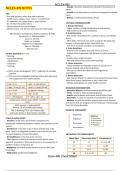
-
Nursing Fundamentals, Nclex-RN Cheat Sheet Complete Summer 2023
- Summary • 14 pages • 2023
- Available in package deal
-
- $7.64
- 2x sold
- + learn more
Nursing Fundamentals, Nclex-RN Cheat Sheet Complete Summer 2023-NCLEX-RN NOTES TIPS: - Deal with patients rather than with machines. - AVOID: never, always, must, “why?”, “I understand”. - If 2 opposites (e.g. hyper-/hypo-), one is correct. - Do not leave the patient alone. - Choose physical over psychological. - IDK the answer: pick the one with the most information. ABC (except in emergencies, distress situations & CPR) Assessment vs. Implementation Acute vs. Chronic Stable vs. Unstabl...
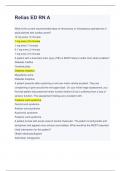 Popular
Popular
-
Relias ED RN A -Solved 100%
- Exam (elaborations) • 18 pages • 2023 Popular
-
- $10.49
- 1x sold
- + learn more
Relias ED RN A What is the current recommended dose of intravenous or intraosseous epinephrine in adult patients with cardiac arrest? 10 mg every 10 minutes 1 mg every 3-5 minutes 1 mg every 7 minutes 0.1 mg every 2 minutes 1 mg every 3-5 minutes A patient with a traumatic brain injury (TBI) is MOST likely to suffer from what condition? Diabetes mellitus Cerebral palsy Diabetes Insipidus Myxedema coma Diabetes Insipidus A patient presents after sustaining a roll-over motor vehicle...
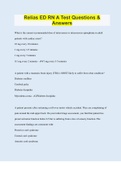
-
Relias ED RN A Test Questions & Answers | 70 Questions with 100% Correct Answers | Verified | Updated 2023 | 23 Pages
- Exam (elaborations) • 23 pages • 2023
- Available in package deal
-
- $12.49
- 21x sold
- + learn more
What is the current recommended dose of intravenous or intraosseous epinephrine in adult patients with cardiac arrest? 10 mg every 10 minutes 1 mg every 3-5 minutes 1 mg every 7 minutes 0.1 mg every 2 minutes - 1 mg every 3-5 minutes A patient with a traumatic brain injury (TBI) is MOST likely to suffer from what condition? Diabetes mellitus Cerebral palsy Diabetes Insipidus Myxedema coma - Diabetes Insipidus A patient presents after sustaining a roll-over motor vehicle accident. They...
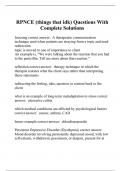
-
RPNCE (things that idk) Questions With Complete Solutions
- Exam (elaborations) • 14 pages • 2023
- Available in package deal
-
- $12.99
- + learn more
RPNCE (things that idk) Questions With Complete Solutions
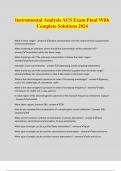
-
Instrumental Analysis ACS Exam Final With Complete Solutions 2024
- Exam (elaborations) • 9 pages • 2024
- Available in package deal
-
- $11.49
- 1x sold
- + learn more
Instrumental Analysis ACS Exam Final With Complete Solutions 2024 What is linear range? - answerAnalyte concentration over the response that is proportional to the concentration. When analyzing an unknown where should the concentration of the unknown fall? - answerSomewhere within the linear range What should you do if the unknown concentration is below the linear range? - answerperform pre-concentration Examples of pre-concentration - answerevaporating, anodic stripping voltammetry Wha...
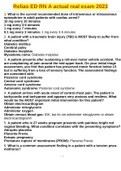
-
Relias ED RN A actual real exam 2023
- Exam (elaborations) • 13 pages • 2023
- Available in package deal
-
- $9.99
- 1x sold
- + learn more
Relias ED RN A actual real exam 2023 1. What is the current recommended dose of intravenous or intraosseous epinephrine in adult patients with cardiac arrest? 10 mg every 10 minutes 1 mg every 3-5 minutes 1 mg every 7 minutes 0.1 mg every 2 minutes: 1 mg every 3-5 minutes 2. A patient with a traumatic brain injury (TBI) is MOST likely to suffer from what condition? Diabetes mellitus Cerebral palsy Diabetes Insipidus Myxedema coma: Diabetes Insipidus 3. A patient presents after susta...
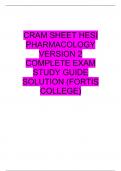
-
CRAM SHEET HESI PHARMACOLOGY VERSION 2 COMPLETE EXAM STUDY GUIDE SOLUTION (FORTIS COLLEGE)
- Exam (elaborations) • 16 pages • 2023
-
- $15.49
- 1x sold
- + learn more
CRAM SHEET HESI PHARMACOLOGY VERSION 2 COMPLETE EXAM STUDY GUIDE SOLUTION (FORTIS COLLEGE) TIPS: − Deal with patients rather than with machines. − AVOID: never, always, must, <why?=, <I understand=. − If 2 opposites (e.g. hyper−/hypo−), one is correct. − Do not leave the patient alone. − Choose physical over psychological. − IDK the answer: pick the one with the most information. ABC (except in emergencies, distress situations & CPR) Assessment vs. Implementation A...
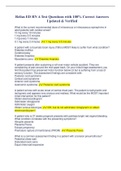
-
Relias ED RN A Test Questions with 100% Correct Answers Updated & Verified
- Exam (elaborations) • 12 pages • 2023
-
- $9.49
- 9x sold
- + learn more
Relias ED RN A Test Questions with 100% Correct Answers Updated & Verified What is the current recommended dose of intravenous or intraosseous epinephrine in adult patients with cardiac arrest? 10 mg every 10 minutes 1 mg every 3-5 minutes 1 mg every 7 minutes 0.1 mg every 2 minutes 1 mg every 3-5 minutes A patient with a traumatic brain injury (TBI) is MOST likely to suffer from what condition? Diabetes mellitus Cerebral palsy Diabetes Insipidus Myxedema coma Diabetes Insipidu...
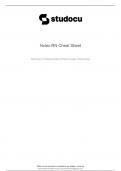
-
Nursing Fundamentals (West Coast University) Nclex-RN Cheat Sheet Complete Summer 2023 Summary .
- Exam (elaborations) • 15 pages • 2023
-
- $8.79
- 1x sold
- + learn more
NCLEX-RN NOTES TIPS: - Deal with patients rather than with machines. - AVOID: never, always, must, “why?”, “I understand”. - If 2 opposites (e.g. hyper-/hypo-), one is correct. - Do not leave the patient alone. - Choose physical over psychological. - IDK the answer: pick the one with the most information. ABC (except in emergencies, distress situations & CPR) Assessment vs. Implementation Acute vs. Chronic Stable vs. Unstable Expected vs. Unexpected Real vs. Potential Odd man out DO NOT ...
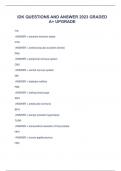
-
IDK QUESTIONS AND ANSWER 2023 GRADED A+ UPGRADE TIA ANSWER = transient ischemic attack CVA ANSWER = cerebrovascular accident (stroke) PNS ANSWER = peripheral nervous system CNS ANSWER = central nervous system DM ANSWER = diabetes mellitus FBS ANSWER = fas
- Exam (elaborations) • 5 pages • 2023
-
- $15.99
- + learn more
IDK QUESTIONS AND ANSWER 2023 GRADED A+ UPGRADE TIA ANSWER = transient ischemic attack CVA ANSWER = cerebrovascular accident (stroke) PNS ANSWER = peripheral nervous system CNS ANSWER = central nervous system DM ANSWER = diabetes mellitus FBS ANSWER = fasting blood sugar ADH ANSWER = antidiuretic hormone BPH ANSWER = benign prostatic hypertrophy TURP ANSWER = transurethral resection of the prostate HPV ANSWER = human papillomavirus HSV

Do you wonder why so many students wear nice clothes, have money to spare and enjoy tons of free time? Well, they sell on Stuvia! Imagine your study notes being downloaded a dozen times for $15 each. Every. Single. Day. Discover all about earning on Stuvia


